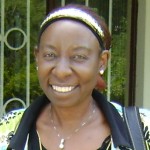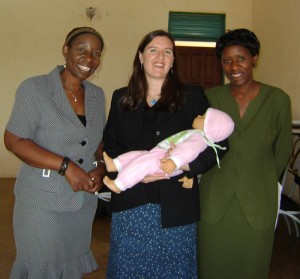 Josephine Nyambe, behavioral change communications specialist for the IYCN Project in Zambia, shares her experiences developing a radio campaign to promote better nutrition for infants and young children.
Josephine Nyambe, behavioral change communications specialist for the IYCN Project in Zambia, shares her experiences developing a radio campaign to promote better nutrition for infants and young children.
In January 2010, we began airing a series of 13 radio programs to encourage mothers to prevent malnutrition for their children in the first two years of life in five provinces in Zambia. The series is called Bushes That Grow Are the Future Forest. The title is a direct translation from a popular local Zambian proverb and it follows Sister Loveness, a health worker, as she travels to local hospitals, villages, and markets to encourage good infant feeding practices and address common barriers to exclusive breastfeeding and complementary feeding.
The programs were born out of a need to reach members of the community outside of health centers. Health workers are very busy and have limited time to counsel mothers on infant feeding, and their reach is restricted to the members of the community who visit the health clinics. During our formative research, we discovered that community members regularly turn to radio stations for health information. We realized that radio would allow us to communicate important infant feeding messages to a broad audience.
The radio programs address beliefs about infant and young child feeding that IYCN identified through formative research. Messages focus on common perceptions and challenges, such as:
- A strong tradition and perception of a need to give water and/or watery porridge to an infant, in part to satisfy thirst.
- Mothers think they are not producing enough milk to satisfy the baby because they are not eating well enough, and they are not producing good enough quality milk because of poor diet.
- Mothers feel that if a child is looking at them while they are eating or drinking it means that the baby wants some of the food or drink.
- HIV-positive mothers may be confused by conflicting information they’ve received on feeding their young infants.
- Mothers do not realize the needed frequency, amount, variety, calorie density, and nutritional content needed by their growing toddlers. Poverty limits their ability to feed as recommended.
To inform the design and implementation of our community-based interventions, we conducted formative research in six districts on health worker and community attitudes and practices regarding infant and young child feeding. The research gave us a greater insight into a number of infant and young child feeding practices that would shape our messages, and we also learned that radio provides a great opportunity for reaching community members with health information.
We started planning the radio campaign in November 2009. After meeting with Gibbs Mweemba, a former colleague of mine, he offered the use of facilities at the station Radio Christian Voice to produce and air the radio series. This was the perfect outlet for our radio programs because of Radio Christian Voice’s broad international reach (the station’s signal is so strong it reaches into Northern Africa) and our formative research concluded that the station was one of the primary means for mothers to receive information.
Serving as a liaison between IYCN and the radio station, one of my first activities was to organize a five-day training with the radio staff. I spent the first two days educating the staff, including broadcasters and support staff, on infant and young child feeding issues. We wanted the radio staff to have a strong working knowledge of infant feeding so they would be prepared to answers questions and respond to listeners. We spent the last three days of the training drafting scripts and programming. Later, we worked with the Manoff Group in Washington, DC, an IYCN Project partner that specializes in behavior-centered programming, to revise the scripts and ensure the messages were clear. I worked closely with the team to provide cultural context and feedback on the scripts.
We produced 13 separate programs that, starting in January, have been broadcast in four languages from noon to 1pm on Monday through Thursday. Each week, we introduce a new program and air it in a different local language starting on Monday with Bemba and continuing through the week with Tonga, Nyangja, and Lozi.
While the scripted portion of each broadcast lasts 15 minutes, a full hour is dedicated to programming about infant and young child nutrition. The first 15 minutes are used to introduce the session and infant feeding topics. This is followed by the scripted series and concludes with a dedicated 30 minutes for follow-up discussions, including questions and answers. Additionally, we have arranged for health workers to join the broadcasters during every third session to answer questions from the radio station.
The initial airing of the radio broadcasts has proven to be a success and we’ve received positive feedback from callers and SMS text messages to the radio station. We are incorporating this feedback into a revised version of the broadcasts. We are currently re-recording and translating each of the 13 sessions in the original four local languages in addition to English, to broadcast beginning the first week of April.

Josephine Nyambe, IYCN BCC specialist, Kali Erickson, IYCN Country Program Manager, and Nampolele Mulenga, IYCN Training Consultant, at an IYCF training in Gonde Lodge.
Radio Christian Voice has a listenership of 3 million people at a given time. We intend to reinforce our reach and strengthen our monitoring of the campaign by introducing a quiz where listeners will write in or call to answer questions. They will win prizes like T- shirts, mugs, and caps. This will enable us ensure that the messages are being understood, that people are listening attentively to the program, and that we are responding appropriately to our audience.
At present, we are reaching five of nine provinces in Zambia. Once the re-recordings are complete we plan to package the programs and share them with community radio stations in other provinces. Radio provides us with a great opportunity to reach a large number of mothers and to reinforce messages that mothers are learning through our community activities. In addition, we are reaching an audience we otherwise may not reach through our existing activities.
Learn more about IYCN activities in Zambia.
Photos: Kali Erickson
Date: May 3, 2010 | Category: Updates from the field
